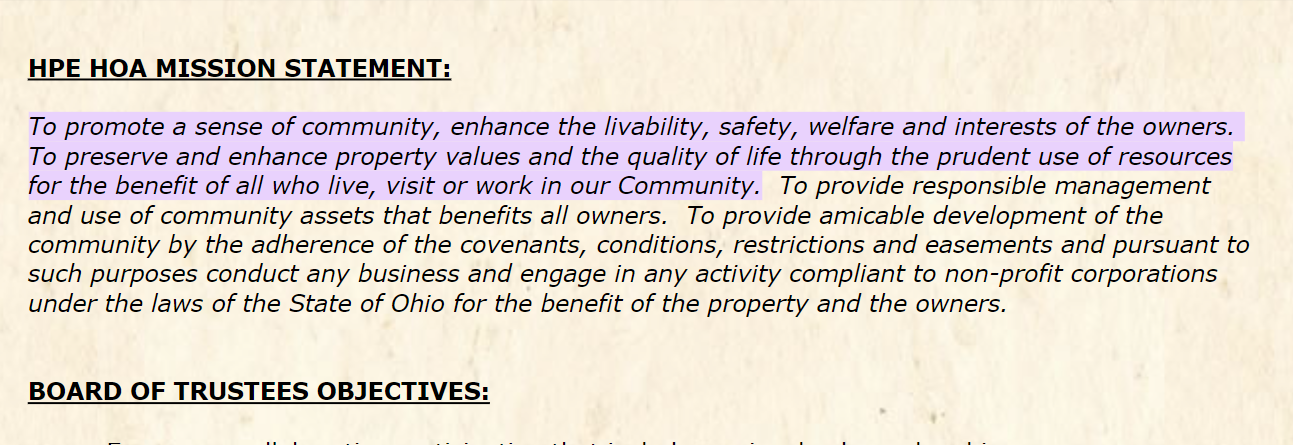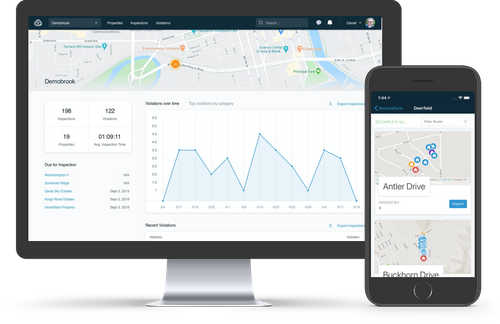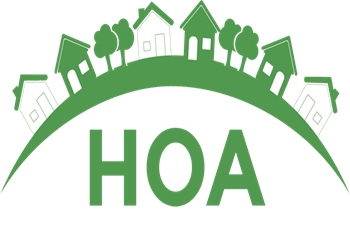- 22 Mar 2022
- Sharifur
: 12 Tips
Do you sometimes feel a pang of envy?
You see stats like the data from the Community Association Institute telling you that nearly all (92% to be exact) HOA residents rate their community experience as positive, and your heart sinks a little.
Your board is up against so many different challenges, after all. Sometimes, dealing with all the legal, financial, and operations stuff can feel too much.
Then again, other HOAs do it, so could you?
Of course! In this guide, I’ll show 12 tips to help you successfully run your HOA.
#1. Have a clear vision and mission for the HOA
A vision statement paints a picture of what the organization wants to become. On the other hand, a mission statement talks about today and what the organization does right now.
Both these things together form the basis of establishing organizational objectives for your HOA. For instance, here is a mission statement from Huntington Park Estates:

It mentions ‘prudent use of resources in the mission statement, among other things. So, some objectives we can derive from this are:
- We are utilizing innovative building products like energy-efficient windows to minimize energy use.
- Maintaining a log of all product warranties and contractor warranties to promote a sustained lifecycle of each installation, etc.
So, your vision and mission statements are the foundation for long-term community planning.
RECOMMENDED READING: How to Create a Mission Statement for Your HOA
#2. Make sure that all the members are invested
This is tricky, I know.
Then again, how could an HOA call itself a success if its members weren’t fully invested in the community?
By developing that engagement, you are building a support system around you. For instance, forming volunteer committees and having them take over part of HOA work this way is easier. And that could take a significant burden off your back.
Here are some suggestions for what to do to build a strong community in your HOA:
- Welcome new homeowners
- Organize social events and encourage members to participate
- Communicate often, and be transparent and polite
- Appreciate and reward engagement publicly
#3. Understand the board's duties and responsibilities
Cliche as it sounds, it’s true. Before you can make anything work, you must know how it works.
This is especially true if this is your first time serving on an HOA board. So, familiarize yourself with how HOAs work.
Please get to know the expectations for your role and its limitations.
Also, I need to get a good understanding of the duties and responsibilities of every board member. For instance,
- An HOA President’s responsibility is to focus on the functioning of the HOA as a whole.
- The HOA treasurer is responsible for making the budget, overseeing billing and collections, etc.
#4. Develop a fair understanding of the governing documents
HOAs run efficiently based on governing documents, like articles of incorporation, CC&Rs, bylaws, and operating rules.
Therefore, having a fair understanding of these documents is essential for everyone on the board. It's the only way to make informed decisions about your HOA operations and the association’s future.
#5. Use the right HOA communication tools
FACT: Communication is vital to HOA success.
But let’s face it; given how many different channels you could use and how many times you should communicate with the community, the task may feel almost impossible.
Then again, others do it. Their secret? They use the right communication tools at the right time.
Dedicated HOA tools, like sureHOA, give you access to features and functionality to manage nearly all aspects of your HOA operations.
A sophisticated HOA management software can help you with:
- Violation notifications
- Architectural change information and communications
- General communications like minutes and newsletters
- Email discussions, etc.
#6. Hold regular member and board meetings
Did you know that meetings are your gateway to better HOA operations?
That is if you structure them correctly, of course.
Now, there are different types of HOA meetings. Depending upon your HOA objectives and regulations in your state laws, the main five types of meetings you may decide to hold are:
- Annual meetings
- Board meetings
- Committee meetings
- Executive sessions, and
- emergency or special meetings.
Some of these meetings will include only the board. Others may involve the whole community. From conceptualizing projects to executing them on-ground and dealing with daily operational issues, HOA meetings take care of everything.
RECOMMENDED READING: How to Structure a Successful HOA Meeting
#7. Conduct a proper reserve study
The reserve study is a long-term financial budget planning tool critical to your HOA's health and sustainability.
In select states, HOAs must conduct a reserve study by law at specific times and create a proper reserve fund. However, there is much more to a reserve study than statutory duty.
Imagine your clubhouse needs a significant overhaul, or your community needs a swimming pool for summer. These are significant expenses, and if you have not done a reserve study and accounted for them in your annual budget, your only choice is to charge your residents a handsome special assessment.
Such an assessment will frustrate most homeowners because of its vast financial implications on their budgets.
On the other hand, a proper reserve fund will help such a situation and keep the HOA board out of stress. So, the necessity of an appropriate reserve study cannot be over-emphasized.
#8. Set the HOA budget
I’m sure you’ll agree - It’s hard to make the right financial decision without a budget. This holds for HOAs, too.
You cannot even think about running an HOA successfully without a budget. But this also means that you need to prepare the budget on time.
Some critical steps in budget preparation are:
- Appointing a budget committee
- Scheduling dedicated budget meetings
- Take a look at previous budgets if possible
- Gathering necessary documents and information regarding revenue and expenses.
- Drafting the budget spreadsheet, etc.
Without a proper budget, an HOA is like an abandoned ship in the ocean without a compass. So, you must invest ample time in getting it right.
RECOMMENDED READING: How to Prepare an HOA Budget
#9. Ensure member dues are paid on time
Every HOA needs money to operate. There are so many expenses to cover every month, after all:
- Maintenance
- Utility
- Insurance
- Community management fees
- Operating expenses for the board, etc.
So, once the board allocates the budget for expenses, it knows how much to charge the homeowners as HOA fees.
All the homeowners must pay their dues on time so the HOA can carry out its routine and planned activities. The HOA board must communicate this correctly to the homeowners and make timely payments easy by giving them all kinds of payment options.
A timely insight into how the HOA uses these funds is also necessary to ensure the members understand the benefits they get from paying the HOA fees.
However, late payments are possible, no matter how reasonable your HOA is, and you must know how to deal with them.
Some things you can do to avoid late payments and discourage payment defaulters are:
- Send out reminders well in advance when a payment is due.
- Provide a grace period for delayed payments.
- Offer payment plans to homeowners genuinely going through financially challenging times as a temporary solution.
In worst-case scenarios, HOAs can also suspend member rights, take legal action, and take to foreclosure as a last resort.
#10. Use the right tools to manage operations
Whether you run a big or small HOA, there are many areas of operation that you must take care of, including, but not limited to
- Maintenance and upkeep
- Financial management
- Coordinating with vendors
- Handling complaints and requests from homeowners, etc.
You are not alone if you think all these responsibilities can drive you crazy, especially as this is in addition to your day job (or business or other responsibilities)!
But with the help of the right HOA management software, you can manage your HOA operations without any sweat.
sureHOA is one such sophisticated HOA management software that can help you:
- Streamline practically all of your processes
- Manage your HOA from anywhere
- Keep all documentation and data relating to the HOA in one place and make them accessible to all.
- Improve internal and external communication and more.
#11. Enforce rules and restrictions effectively
CC&Rs ensure the proper running of the community and make the neighborhood a great place to live in.
Well, providing that residents follow them thoroughly.
Unfortunately, as I’m sure you know very well, not everyone does.
Sometimes, you must enforce a rule fairly, objectively, and uniformly. You must document and communicate the rules well to the members and eventually implement them effectively.
Failure to do so can cause chaos and confusion in your community and breach your fiduciary responsibilities.
There is a whole process around enforcing CC&Rs, and tools that can help. Our tool - sureHOA, for example - lets you or your HOA manager automate the entire process of managing HOA violations. With sureHOA you can record custom rule violations and send notice letters in minutes.
You can also review completed inspections and make automatic and comprehensive violation summaries to keep improving the process.

RECOMMENDED READING: How to Enforce CC&Rs
#12. Don’t be afraid to ask for professional help
Most HOA boards consist of volunteers - members of the community. As a result, not everyone has the same expertise or background necessary to manage the association.
And sometimes, you and your colleagues can face a challenge beyond your expertise or experience.
Don’t be afraid to ask for outside help in those cases.
First, solving the issue on your own could cause more damage. It can also burn you and your colleagues out.
Also, hire an HOA manager if you can. The person might become your HOA's heart and soul and help ensure the association runs smoothly. They will execute practically all of the association’s tasks, freeing you to take a more strategic approach in your role.
A reserve study is another example, which is a highly specialized task. It needs a certain level of subject knowledge, like a certified Reserve Specialist from the Community Associations Institute Association.
When a task is beyond the expertise of the board or HOA members, do not shy away from hiring a professional.
And that’s it…
These twelve tips should help you run and manage an HOA with success.
Good luck!





